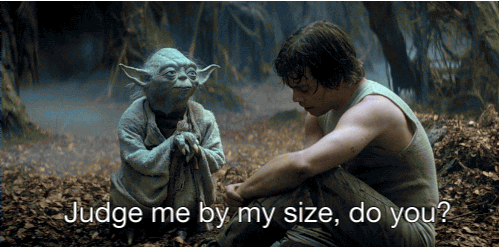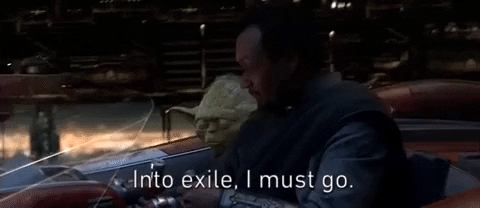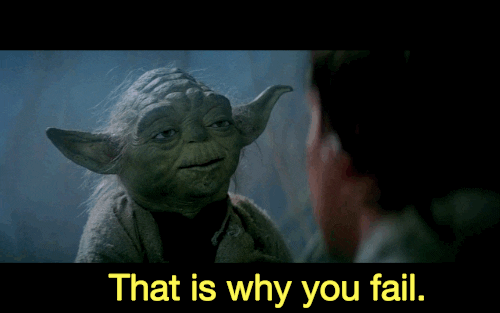I’m a big Star Wars fan. And one of my favorite arcs in the whole franchise is from “The Last Jedi.” (Yeah, I like the new trilogy, die mad about it, haters.) Luke Skywalker, Jedi of myth and legend, is talking to Rey. Rey is a young girl from nowhere, daughter of no one, she says. She grew up as an orphan on a dull planet, scrapping mechanical parts for food. She’s got lots of raw talent with The Force, but Luke is skeptical of her. He’s educated. He’s run a school for Jedi! He knows where the cave is that has the sacred Jedi texts! He teaches her a lesson, both literally and figuratively. It’s not just about moving rocks, he sneers at her, calling back to his on Jedi training on Dagobah where he frequently struggled to move rocks. Being a Jedi, and understanding The Force, is about something bigger, something more important, he insists.

Luke is distrustful of Rey and sees a darkness in her. He is scared of the dark side of The Force — he lost his father to it many years ago. His fear of the dark side of The Force also lead him to nearly murder his nephew, Kylo Ren, while training him to be a Jedi, a traumatic incident that ended up securing his move to the Dark Side. Luke determines that the Jedi must be destroyed.
Later on in the movie, Rey saves the entire Resistance. By moving rocks.
What does it mean? Well, one thing it means is that Rey is more than the nobody she thinks she is. But it also means that Luke was wrong. It’s not just about the sacred texts, or the philosophy, or the practice that a beginner would never understand. Sometimes, it’s just about moving rocks. Sometimes moving rocks can do more than a lifetime spent studying can do.
And that brings us to our tale today.
Burning Health at Every Size to the Ground
Much like Luke’s determination to destroy the Jedi, there are certain actors who believe that the Health at Every Size needs to be destroyed. I am talking, specifically, about Lucy Aphramor. Lucy is a poet and dietitian who co-authored the sacred Jedi texts of HAES, “Body Respect: What Conventional Health Books Get Wrong, Leave Out, and Just Plain Fail to Understand about Weight.” This and other books are foundational to the current understanding of HAES. But it may come to a surprise to some that Lucy is the co-author: they are often written out of the conversation about these books. And I have no knowledge whatsoever of the behind-the-scenes issues that may have lead to that, but in practical terms, at least part of it is that Lucy is now critical of HAES as a construct and a movement.
This week, Lucy published a HAES-critical piece on Medium called “Eight Signs of White Supremacy in HAES (Health at Every Size) and Ideas for Action” and posted it in several groups for fat studies and HAES professionals. Because of Lucy’s exalted position as a “founder” of HAES, the piece was largely met with hushed reverence from other thin, white HAES professionals. But other people in these groups were pretty pissed. A few friends of mine who saw it chatted me about it: “Have you seen this?!” If you make your way through it, you might be able to understand why, but here’s a quick breakdown:
- Jargon and “Inside Baseball” Talk: The language in this piece is impenetrable, even by people who are entrenched in academia. This is Activism 101. If you want your words to have an impact, they need to be accessible. This is not an accessible piece of writing. Example: “Exalting western science represses other cosmovisions, which is incompatible with liberation. The infrastructure of EBP strongly aligns with the values and practices of supremacist thinking.” Huh? Cosmovisions?
- Naming Problems Without Providing Evidence: So, the structure of the piece is eight things that are wrong with HAES. Okay, cool! I have one of those, too. But there are very few, if any, examples of the harm being named in action. The piece presents these problems without really substantiating that they exist. We’re just supposed to trust, based on the author’s HAES bonafides. But isn’t that the same thing this piece is arguing against?
- Failing to Provide a Road Map Forward: So, there’s a problem. Okay, call it out! But, where do we go from here? If we’re going to burn it to the ground, how do we rebuild? Do we really need to burn it to the ground, or can we work on these issues? Lucy’s answer to these questions is to sign up for their newsletter. (A friend did. The friend did not learn anything about it.) There are some suggestions, sure, but they are more of the impenetrable jargon and less a clue as to what we should actually do moving forward.
- Throwing Fat People Under the Bus: I’m just going to say it: there is a thick fog of deep discomfort with fat people emanating from this piece and Lucy’s other posts. I have no idea if that is the case, in their heart. But this post seems to posit that HAES is guilty of the worst kind of white feminism and colonialism and thus needs to be thrown out… despite the fact that many of the people who are in HAES communities and adhere to its concepts are fat, BIPOC, disabled and/or chronically ill, queer, gender-nonconforming, and economically disadvantaged. Where are fat people in this piece? Honestly, where are the people in this piece? This is all about systems, and not about people, and certainly not about fat people.
Update 6/15/2020: It looks like Lucy has updated their piece with a paragraph referencing fat activism and a footnote that this paragraph was in the draft, but removed. First, the comment that, “The HAES I know through the actions, sensibilities, and scholarship of a community and its canon isn’t true to these radical roots,” is inadequate because it erases the scholars and professionals who are very much STILL RADICAL, STILL DOING THE WORK, STILL CENTERING BODY LIBERATION, and STILL BEING INTERSECTIONAL AF. We’re here! I’ve talked to them lots since this first piece was published! I’m not sure how to convince Lucy that we exist and do count! The footnote also does not address the absolute gobs of feedback that have been given to them since they published this piece, which prompted them to add the paragraph “back in,” making it seem like it was just an editing mistake, which erases the conversation that was had in its aftermath. The dogged erasure of people and professionals who don’t fit the point Lucy is trying to make here (many of them fat, BIPOC) adds to the very thing this piece is arguing is a problem.
The Erasure of Fat Activism
So, there’s a problem we’re not really allowed to talk about in many spaces, and it’s this: Lindo Bacon and Lucy Aphramor’s books did not invent Health at Every Size as a movement. The ideas behind the books, and the movement, have been around for a very long time. They have been around since the 1960s and 1970s, since NAAFA (National Association to Advance Fat Acceptance) was formed. Books like Paul Campos’ “The Obesity Myth” were released years prior to “Health at Every Size.” Marilyn Wann started her zine Fat?So! in 1994, and it was published as a compilation in 1998. There were plenty of people doing this work long before it was ever called “HAES.” There was just one problem: many of the people promoting these ideas were fat. And they were angry fatties. Many of them were fat lesbians, gasp! How off-putting, right?! How scary!

Health at Every Size (HAES) came along and did two things: it put the basic tenets of what fat activists had been saying for decades into a context of academia and research. And it gave it thin spokespeople who were more trustworthy than, you know, unsightly fat people with lived experience. They approached the issue of fatness from, “Well, how can we get them to be healthier?!” This was palatable to thin people, some people in science and medicine, and some dietitians. It lived in that comfortable space of talking about fat people as problems to be solved, only presenting the solution as “health-promoting behaviors” rather than weight loss. It was a little bit of fat activism, but also a little bit of fat obedience. It was talking about fat people, sometimes around them, rather than fat people talking. Somehow, framing the issue of weight stigma and size discrimination as harmful to the goals of health clicked with people in ways that fat people telling the world that fatphobia was harmful to them did not. And so it began.
We experienced something of a sea change both in how the general public feels about dieting, how eating disorders are treated, and how health in general is approached. The combination of Intuitive Eating and Health at Every Size was once radical, but is now the norm in many realms. Dietitians who are promising weight loss are often shunned, while those who promise to help people find peace with food and freedom from dieting amass large followings, publish books, and find careers. Some doctors are even starting to get loud about weight stigma! It has been awesome to see. And since fat people needed this to, you know, access healthcare, we were okay with a little bit of erasure.

But, now, we seem to have entered a world in which fat people seemingly don’t exist, except as misery porn or thought experiments. Lucy Aphramor managed to write a whole piece about HAES without really mentioning fat people, or outlining fat erasure as a problem. We have been pushed further to the margins, by thin, white social workers and dietitians who are drunk on paradigm shifts. Thin eating disorder patients (and thin eating disorder patients who treat other people with eating disorders) took precedence over us. It’s become a place where we constantly wave our hands in the air going, “HELLO WE ARE RIGHT HERE, PLEASE NOTICE US, WE HAVE SOMETHING TO SAY” and thin people still continue to treat us as intellectual exercises, theoretical beings. The qualifications required to discuss HAES in any meaningful, respected, lucrative manner kept getting raised — lived experience? No, you need at least a Master’s to be listened to, and no, we would not like to talk about how academia has a race and a class problem, we acknowledge our privilege… while leaning into it.
And now those same people want to burn HAES to the ground for not being inclusive enough.
The Great Derailment
One of the things that has been done as we have been pushed aside while The Grownups talk is pointing out all the other problems in the world. HAES is intersectional, they say. How can we possibly try to address This Specific Problem without trying to address this Very Big Problem?! Maybe we just shouldn’t try at all!

Here’s the thing. HAES should be intersectional; fat activism definitely is. “Intersectional” does not necessarily mean that a single movement must solve all of the social issues that intersect at once. It means that, when we are talking about access to medical care, we must recognize that the Blacker or browner, fatter, queerer, and poorer someone is, the more profoundly they are affected. It means that we should fight for more fat trans people to have access to gender affirming surgery alongside talking about access to knee replacement surgeries for fat patients. It means that we must address the issue of Black and Latinx women being more likely to engage in bulimic behaviors and less likely to be diagnosed with and treated for eating disorders. It means we must fight for a world where healthcare is considered a right and all people can access it equally. It means we must move the rocks and boulders that sit in people’s paths as they try to live their lives and take the best care of their health that they can, whatever that looks like for them. Some people are being crushed by those boulders; those are the people we need to attend to first.
It does not mean that we cannot talk about advocating for MRI machines that fit larger bodies until we completely solve racism. It does not mean that we cannot advocate for more accessible seating and equipment in medical practices until we’ve arrived at a fair and equitable society in every sense. It does not mean we can’t develop apps telling fat people whether there is a fat-accessible bathroom in a public space without also addressing every other imaginable accessibility need. It does not mean constantly moving the goalposts so that there is no realistic condition under which weight stigma can be addressed. It does not mean using intersectionality as a cudgel. It’s not a zero-sum game. Intersectionality means that these systems of oppression are all connected. Intersectionality should not be used to to invalidate systems of oppression that you think are less urgent, or less real. (That’s what it’s really all about, isn’t it?)
Fat activism (and HAES) is often sidelined in favor of other issues. We can’t focus on _____, this other issue is more important! But that’s not true. Because like The Force, they are all connected. HAES is simply one tool in the toolbox that can be used to fight systems of oppression.
And while we’re dismantling other systems, we can still move rocks.

A Road Map Forward
We really and truly do not need to burn HAES as we know it to the ground and start again. (And that’s another problem — Lucy is promoting something called “Well Now” with this piece, and in response to questions from fat people about what it is, has simply told them to sign up for their mailing list for more information.) We just need to go back to its roots. Sure, the Jedi texts that Lindo Bacon and Lucy Aphramor wrote are important, but we don’t need to burn the texts and start again. We just need to remember where they came from: fat activism, the thing HAES strategically erased to make it more palatable to the masses.

It really doesn’t need to be more complicated than that. Thin, white academics have appointed themselves the gatekeepers of HAES. They have elbowed everyone else out of the room only so they could wring their hands about why they were the only ones in the room. (While marginalized people bang on the door going, “HEY WE ARE OUTSIDE, CAN YOU PLEASE LET US IN, THIS IS OUR MOVEMENT & WE NEED IT???”) Lucy’s piece notes this, but then engages in it, and doubles-down on the idea that they built the room. They did not. Other people built the room, but they claimed ownership, invited all their friends, and decided it needed to be burned down. (If we want to talk about colonialist attitudes, okay, there ya go.) It feels like a coup.
This is very simple: Fat people need access to compassionate, competent medical care. “Fat people” is a group that includes a lot of people: Black people, indigenous people, Latinx people, queer people, trans people, white people, cis people, rich people, poor people, disabled people, chronically ill people. We need to move more rocks, remove more barriers that prevent people from getting the care they deserve, whether that is through advocating for universal healthcare or advocating for more size-accessible seating at your doctor’s office. All of these things have a place. None of these things take away from any other social justice cause, because fat people are a marginalized group where people often live their lives in the intersection of multiple oppressive systems. Fat activism is social justice work. HAES is social justice work. HAES advocates are supposed to be Rebel Scum, fighting for the resistance. If you aren’t, well, you can move over and let the real resistance take over. We’re ready to fight. We’ve been fighting, while y’all were hiding in a cave with Luke Skywalker talking about COSMOVISIONS.
Of the popular phrase, “health is not a moral imperative,” Lucy writes in their Medium piece: “The slogan collapses ‘health’ to personal practices. There’s no way of incorporating the fact that racism harms health. It removes power and relationship and denies we have any moral accountability for each other’s wellbeing. Adding riders about health being multi-dimensional doesn’t repair the core problem with the paradigm.” And then presents their new program/approach/paradigm/praxis/cosmovision Well Now™ as the new evolution that will save us all by properly addressing race. EXCEPT WE’VE BEEN DOING THAT, BEEN HAVING THESE CONVERSATIONS ABOUT THE RELATIONSHIP BETWEEN RACE AND HEALTH, IT’S EVEN IN CHRISTY HARRISON’S PIECE ON RACE, BMI & COVID-19 FOR CRYING OUT LOUD, NO ONE IS IGNORING SOCIAL DETERMINANTS OF HEALTH. Just because you just thought of it in the past few weeks does not mean that it has not been part of the discussion before you entered the chat.
Is this lead gen for a new business? Polite spilling of tea related to other people in the HAES game? (Which it certainly seems like, given that “Epistemic Justice” is the #7 wrong thing and Lucy lists themselves as a victim of it, alongside Cite Black Women, while also failing to cite the Black woman on Instagram who inspired this post in the post itself, only tagging her in some social media posts.) HAES, as a movement, could certainly improve, and the people pushed to the margins have been banging at the door for a long time, trying desperately to be heard. If this is truly what the academic overlords of HAES want to see, more diversity, more voices, less white feminism, THEN STEP ASIDE. Let ’em in. Let them have the room you elbowed them out of. Fat people have been begging you to listen to us. Black & Latinx women have been trying to be heard over the din of white people fretting about the lack of diverse voices for a long, long time. We don’t need another coup. We don’t need yet another paradigm shift.
We need you to return what was ours in the first place, and step aside, so we can continue moving rocks.


Thanks for writing this. I actually felt that Lucy’s most recent article was more readable than some of their past articles on this topic. A common thread that’s bothered me is that they argue about moving away from a binary, but then promote Well Now/connected eating as the “right” way. It has been interesting to see the discussion unfold in various Facebook groups, and you’re right that it’s been mainly fat folks (for whom HAES is for) who have been most critical.
If I may offer a correction – Lucy co-wrote Body Respect, not Health At Every Size.
LikeLike
Thank you! Edited to reflect your note about authorship. 🙂
LikeLike
This is FUCKING BRILLIANT and expresses everything I was feeling when I read the original article. Thank you for taking the time to write this and then share it. I feel heard. Thank you.
LikeLiked by 1 person
Thank you so much for writing this! I was super surprised that so many people who are HAES-aligned agreed with much of what Lucy was saying in her article. HAES is a social justice framework!
LikeLiked by 1 person
As an advocate for people with ED, I see hundreds if not thousands of cases of thin voices drowning out, shaming and suppressing the voices of those who are fat, black, and traditional (white/thin) gender/sexuality non confirmative.
Fat voices need to be privileged. To be centered front and foremost. And by that I do NOT mean as people who have been interviewed by thin white academics who use them as “examples” in pieces of writing that reinforce thin white superiority in the discourse. I call it “thin-splained”. They need to be given the megaphone, and for everyone else to get off the stage and sit in the uncomfortable seating and LISTEN – with the aim of listening to be led, and taught, and informed – not to strengthen the already suffocating grip on the conversation.
LikeLike
Yes! Thank you for this. I found Lucy’s article indecipherable. I was always a smart person but came to “education” late and despise academic jargon – it’s elitist and exclusive, a great irony for her piece. I love how you have laid out problems in very understandable language. And I agree – erasure of fat people is happening. It’s not wrong to criticize movements, or parts of movements, but it is to offer no clear way forward.
LikeLiked by 1 person
Thank you thank you! I read the original medium article and had such a hard time understanding it and conceptualizing where it fit in the larger picture. I also explored Lucy’s website and other writings trying to figure out where their work fit in and was really struggling. Thank you for writing this. It has been immensely helpful for me.
LikeLike
This was amazing. Thank you for stating this so clearly. You’ve described things here that I hadn’t thought of after reading Lucy’s piece.
LikeLike
Thank you so, so, so much for writing this. Thank you for articulating so well what I felt when reading that article – and bringing up so many additional thoughts that hadn’t even formed in my head. I am very appreciative!
LikeLike
Outstanding work! THANK YOU for this piece.
LikeLike
Thank you for this inspired piece! As a NAAFA member from the early 80’s, I really appreciate your historical accuracy, your recognition of the movement and your openness to find the interconnected path forward.
These are critical times for us to strengthen our connection to each other so that we can influence the systemic issues hurting all of us.
LikeLike